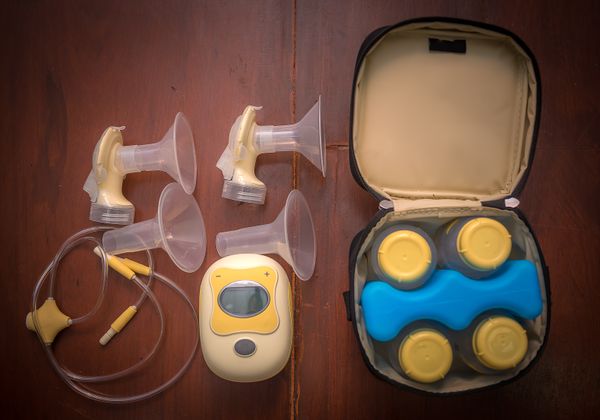Congratulations, new mama. You've just accomplished the tremendous, transformative experience of carrying and bringing life into the world! Take a moment and meditate on that because in just a short while, you're on to the next thing—breastfeeding.
One of the biggest surprises I remember from delivering my first baby was that as soon as I held her for the first time—completely exhausted from over two days of labor—the nurses started talking to me about breastfeeding. I knew I was in a hospital that strongly advocated for moms to nurse right away, but I was still surprised.
"Can I get a couple hours to rest?" I thought.
Now I realize why they stood by me and encouraged me in my nursing journey—even if it felt, at the time, like they were rushing me. Breastfeeding in those early hours and days can be challenging.
While breastfeeding is the most natural way for us to nourish our children, it does not always happen naturally or easily. There can be a steep learning curve for both mom and baby. Those nurses knew that without active support early on, it might be hard for me to start and continue breastfeeding.
And that was important to me. When I was pregnant, I decided to nurse my daughter for at least one year, based on literature and medical advice from the American Academy of Pediatrics and the World Health Organization. But after the first week, I distinctly remember wondering how I would ever make it that long. It seemed impossible.
My milk did not come in for five days; my daughter did not latch properly without significant effort for at least seven days; she fell asleep right away whenever she finally did latch properly; she was barely producing enough wet diapers; and my husband, who was soon returning to work, had to actively help get her latched. I was consumed with a new love and tremendous anxiety all at the same time.
But, by the time she was three months old, nursing was natural and—dare I say—easy! When she was old enough to sit in a baby carrier, I was even nursing hands-free and went out and about. It became second nature. My daughter and I ended up continuing our nursing relationship for 16 months.
Because I understand the stress and challenges a new nursing relationship can bring, I am happy to share my story of how I succeeded at breastfeeding. I did it with a lot of help.
Here are five ways I got through the initial hardest weeks of breastfeeding:
1) Get educated early—while pregnant. Thankfully, I had friends who had babies just months before I did. Because they also faced challenges, they wisely suggested that I start getting educated on breastfeeding. When you're pregnant, you're usually consumed with the pregnancy and labor and delivery. Because of their advice, I took a short breastfeeding course with my doula. It was helpful to know, at least in theory, what a proper latch should look like and to get some tips—even if I had to review everything later.
2) Ask the nurses and hospital lactation consultant for help before you go home. After delivering, I was so tired. I wanted to say, "I'll really figure it out later." But I tried to remember that when I went home in a couple days, I wouldn't have so much help at my fingertips. Hopefully, the hospital where you deliver will have trained professionals who can help you.
3) Call a lactation consultant early. It's totally normal to feel frustrated and lack confidence. Instead of carrying that burden alone, call a lactation consultant. Doing so early will eliminate days and weeks of stress. It's so helpful to have someone who can give you hands-on tips specific to your baby and circumstances. And don't feel like you can't call if you've nursed before. Even though I was better prepared to nurse my second child, I knew things weren't going right. So I called a lactation consultant, and it was worth the visit, even just to hear things were OK.
4) Bookmark some online resources. Now moms can have answers right away at their fingertips. Get to know some reliable online resources that might be able to answer questions when you're nursing in the middle of the night. Here's our complete guide: HealthyWomen's Breastfeeding Tips for New Moms. A couple other sites to bookmark are KellyMom.com and La Leche League International.
5) Join a moms group. The La Leche League had a support group that met weekly in my area. When I was pregnant and learned about it, I remember thinking that sitting around talking about my breasts with strangers was not for me. But since I had just moved to a new area and wanted to meet other moms, I warily decided to go. And I'm so glad I did. Being around other women who were also breastfeeding and experiencing similar challenges encouraged me. Also, once you're past the most challenging days, you'll likely have some other nursing questions (I started getting clogged ducts and had mastitis). Other moms are so knowledgeable, and a licensed lactation consultant usually hosts the meetings and can answer questions.

Overcoming Breastfeeding Challenges as a New Mom
Breastfeeding can be challenging in the initial days with a new baby, but with a lot of support, you can succeed and meet your nursing goals.
Dec 14, 2016
Apr 27, 2022
Real Women, Real Stories





